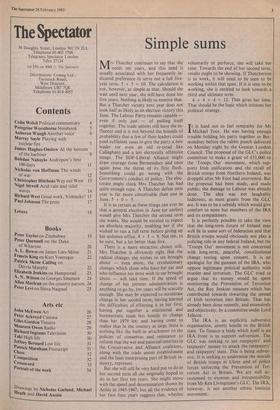Simple sums
Mrs Thatcher continues to say that she needs ten years, and this need is usually associated with her frequently in- dicated preference to serve out a full five- year term. 5 + 5 = 10. The calculation is not, however, as simple as that. Should she wait until next year, she will have done her five years. Nothing is likely to remove that. But a Thatcher victory next year does not look half as likely as an election victory this June. The Labour Party remains capable even if only just — of pulling itself together. The trade unions still have the in- fluence and it is not beyond the bounds of probability that a few of their leaders could pool sufficient nous to give the party a new leader (or even an old re-tread like Callaghan) and a less electorally offensive image. The SDP-Liberal Alliance might draw courage from Bermondsey and once again pose the threat of its first flush. Something could go wrong with the Government's conduct of policy. The elec- torate might think Mrs Thatcher has had quite enough rope. A Thatcher defeat next year is far more conceivable than one in June. 5 + 0 = 5.
It is as certain as these things can ever be that a general election in June (or earlier) would give Mrs Thatcher the second term she wants. She would be entitled to expect an absolute majority, enabling her if she wished to run a full term before giving up her arduous office. 4 + 5 = 9. Not ten, to be sure, but a lot better than five.
There is a more attractive choice still. Mrs Thatcher is obviously right that the radical changes she wishes to see brought about — even more, the revolutionary changes which those who have her ear and who influence her most wish to see brought about — will take time. If the speed of change of her present administration is anything to go by, ten years will be scarcely enough. She may be expected to accelerate change in her second term, having learned the difficulties of effecting it in her first; having put together a ministerial and bureaucratic team less hostile to change than her 1979 lot; and having come to realise that in the country at large there is nothing like the built-in attachment to the policies of consensus and resistance to reform that the wet and paternal centrists in the Conservative and Alliance coalitions, along with the trade union establishment and the least enterprising part of British in- dustry, represent.
But she will still be very hard put to do in her second term all she originally hoped to do in her first ten years. She might move with,the speed and determination shown by Attlee in 1945-1947; but all the evidence of her first four years suggests that, whether
voluntarily or perforce, she will take her time. Towards the end of her second term, results ought to be showing. If Thatcherism is to work, it will need to be seen to be working within that span. If it is seen to be working, she is entitled to look towards a third and ultimate term.
4 + 4 + 4 = 12. That gives her time. That should be the logic which informs her political strategy.
It is hard not to feel sympathy for Mr Michael Foot. He was having enough trouble holding his party together in Ber- mondsey before the rabbit punch delivered on Monday night by the Greater London Council. The proposal of the GLC's police committee to make a grant of £53,000 to the 'Troops Out' movement, which sup- ports Irish unification and the recall of British troops from Northern Ireland, was dropped after Mr Foot had intervened. But the proposal had been made, and made public; the damage to Labour was already done. The idea was not laughably ludicrous, as most grants from the GLC are. It was to be a subsidy which would give comfort to none but members of the IRA and its sympathisers.
It is perfectly possible to take the view that the long-term future of Ireland may well lie in some sort of federation and that British troops would obviously not play a policing role in any federal Ireland; but the `Troops Out' movement is not concerned with long-term, peaceful, constitutional change resting upon consent. It is an apologist for the gunmen of the IRA, who oppose legitimate political authority with murder and terrorism. The GLC tried to argue that its money would be spent monitoring the Prevention of Terrorism Act, the Roy Jenkins measure which has contributed towards thwarting the spread of Irish terrorism into Britain. That has already been done recently, and extensively and objectively, by a committee under Lord J el licoe.
The IRA is an explicitly subversive organisation, utterly hostile to the British state. To finance a body which itself is an IRA front is to support subversion. The GLC was seeking to use ratepayers' and taxpayers' money to attack the ratepayers' and taxpayers' state. This is being subver- sive. It is seeking to undermine the morale of British troops in Ulster and of police forces enforcing the Prevention of Ter- rorism Act in Britain. We are well ac- customed to excesses and irresponsibility from Mr Ken Livingstone's GLC. The 1RA, however, is not another ethnic feminist movement.










































 Previous page
Previous page